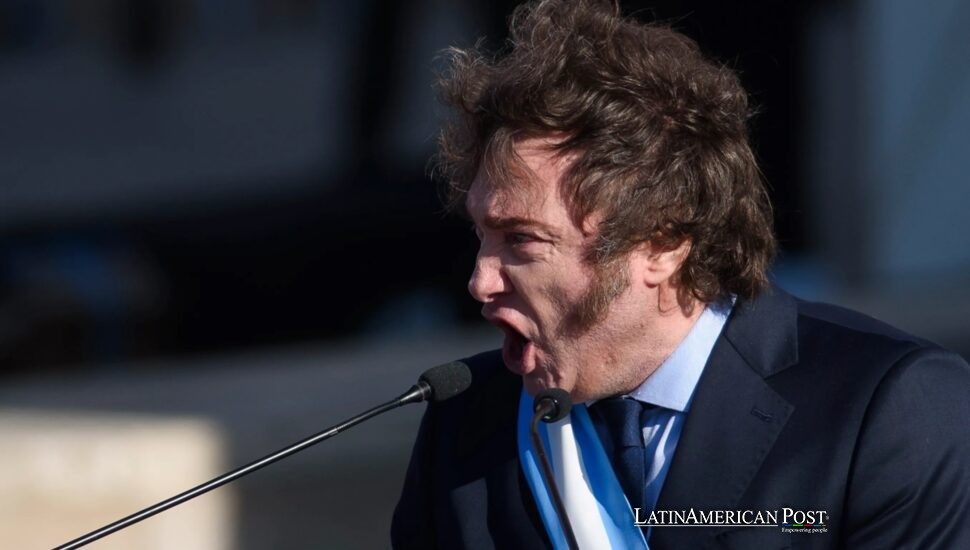Argentina Milei’s Deregulation Gains Influence Trump-Musk Economic Ideas

Argentina’s bold regulatory overhaul under President Javier Milei has gained global attention, drawing praise from figures like Elon Musk and ex-President Donald Trump. Despite lingering concerns, Milei’s cuts to bureaucracy and market reforms raise questions about long-term success in Argentina’s battle with recession.
A Ministry at the Heart of “Chainsaw” Reform
At the Ministry of Deregulation and State Transformation in Buenos Aires, two stacks of legal documents await either pruning or full repeal. They rest on a simple wooden desk next to a figurine of libertarian President Javier Milei clutching his trademark chainsaw. A biography of Elon Musk lies nearby, indicating the transnational synergy between Argentina’s reforms and the U.S. movement for a leaner government.
“It’s a nerve center,” explained Deregulation Minister Federico Sturzenegger, age 59, who spoke at length to Reuters in a recent interview. “We see ourselves as the catalyst for spending cuts and rolling back regulations to free the economy.” Sturzenegger’s team is small but wields the potent authority to take the old rulebooks and slash them down via decrees granted under a year-long emergency measure from Congress. A digital countdown clock in his office ticks away the remaining days under this legal window.
According to Reuters, Sturzenegger is widely credited with designing Milei’s so-called “chainsaw” approach: an uncompromising vow to hack away state bureaucracy. Under this policy, Argentina has reduced the number of government ministries by half, from sixteen to eight, effectively demoting or merging education, culture, labor, gender and diversity, and social development. State payrolls have shrunk by 10%, eliminating around 40,000 public sector jobs. The government has introduced a hiring freeze and “suitability” tests for current employees to see who should remain on the job, with a pass rate of 96%.
“We’ll have a more prosperous economy the smaller the size of the state,” Sturzenegger told Reuters. He added that the process was meant to “get the state out of the way,” describing red tape as the main impediment to Argentine growth. “Now it’s time to bring the deep chainsaw,” he said. “If an office or department falls on the list we said ‘no’ to, that area must be closed. Closed.”
While Argentina’s experiment differs in scope from U.S. policies, fans of deregulation see parallels with Elon Musk’s Department of Government Efficiency (DOGE), an initiative in Washington that has targeted federal jobs at an unprecedented rate. “They talked a lot before Trump’s election,” Sturzenegger recalled regarding President Milei and Musk, telling Reuters that the Argentine president “may have helped shape Musk’s thinking” on how to pare back public administration.
From Crisis to Drastic Measures
Argentina’s pivot to deregulation arose from a backdrop of chronic economic turmoil: repeated recessions, soaring public debt, currency controls, and triple-digit inflation. Even as the country has emerged from its most recent downturn, poverty remained high, though it fell modestly from above 50% last year. Milei’s administration attributes part of the improvement to targeted direct transfers for the poorest citizens.
Meanwhile, the government has slashed budgets for social programs such as soup kitchens and diversity initiatives, arguing that private charities and civic groups can more effectively manage these tasks.
Reuters reports that Elon Musk himself has praised Milei’s austerity push. “This is awesome,” Musk posted online on January 25, linking to a video of Sturzenegger explaining Argentina’s “deep chainsaw” cuts. Indeed, some credit the policies with boosting investor confidence in the country’s agricultural exports and budding energy sector. But critics say the approach might tear the social safety net asunder.
Silvina Batakis, a former minister under the leftist administration and currently housing minister in Buenos Aires province, told Reuters that her constituency was “suffering from the threat of permanent cuts.” She elaborated, “I believe in fiscal balance and a more efficient state, but this shouldn’t be achieved by taking away cancer patients’ medications or destroying people’s retirement. People should be the priority of any government.”
Nevertheless, President Milei’s popularity remains steady. A January poll by Atlas Intel, cited by Reuters, showed him a 47% approval rating, up from 43% last July and matching his popularity from a year earlier. For many Argentines, Milei’s brand of libertarian populism rings true in a country notoriously mired in red tape. A longtime champion of “burning down” the state, he initially floated radical proposals like eliminating the central bank or adopting the U.S. dollar as Argentina’s currency. However, he has focused mainly on reforms he can feasibly pass with only tenuous congressional support.
The deregulation ministry’s “catalog of laws to be scrapped or revised” demonstrates the extent of Argentina’s labyrinthine codes and rules. Many are holdovers from decades of populist or protectionist policies that complicated trade, stifled competition, and failed to curb inflation. “We want to free people from these arbitrary constraints,” Sturzenegger told Reuters. “Why mandate a specific type of watermelon packaging if it imposes double-handling costs on exporters?”
Global Allies and Local Critics
While the libertarian wave in Argentina resonates with foreign admirers, especially Musk and Trump, Milei’s government does not command unanimous support at home. Opposition lawmakers, many from leftist or Peronist backgrounds, accuse the administration of tossing aside essential labor protections or ignoring historically marginalized communities. The abrupt closure of some agencies has triggered internal controversies about the moral implications of leaving families without resources, even as direct payouts offset some losses.
As a point of reference, the U.S. government’s approach to deregulation, spearheaded by Musk’s DOGE, can appear more dramatic—attempting to cut three-quarters of federal jobs, for instance. In contrast, Milei’s administration has reduced public sector posts by 10%. But the Argentine program is still remarkable: the social development ministry’s services, once considered sacrosanct, have either been merged or minimized, redirecting funds primarily to direct cash grants for the poorest. “One can’t pick and choose social programs like they’re items on a menu,” responded Batakis in her conversation with Reuters. “Some might be outdated, but you don’t just yank them all because you think the market will handle it.”
Milei’s defenders counter that many programs were mired in corruption or inefficiency. “We are not removing every safety net,” Sturzenegger insisted, telling Reuters that the government had hiked direct payments for people in need, which helped quell widespread protests. He pointed out that while some liberal critics worry about undermining progressive gains, the new approach has accelerated economic growth from the previous year’s slump. The question, though, is whether these gains hold once the short-term bounce from post-recession recovery levels off.
Milei’s brand of socially conservative libertarianism—pro-market but suspicious of cultural liberalism—means that agencies dedicated to gender rights or diversity have faced some of the harshest cuts. “We don’t want to feed a sprawling bureaucracy around identity politics,” the president said at a rally last fall, as reported by Reuters. The tension arises because a significant bloc of Argentine youth has championed progressive causes like LGBTQ+ rights or women’s empowerment. Some remain conflicted: they approve of economic liberalization but resent the rollback of diversity offices.
The Road Ahead for Argentina’s Bold Gamble
Argentina ranks poorly on regulatory and business-climate indices and has historically been “gummed up” by extensive rules. The World Bank’s Ease of Doing Business ranking in 2020 placed Argentina at 126, just a notch ahead of Iran. Another index from the Fraser Institute pegged it near the bottom for regulatory burden. Backers of Milei interpret these measurements across nations as proof that extreme cuts make sense.
Success across generations takes more than spending cuts. Argentina needs to gain the trust of people who invest money, limit price increases, and address its debts through careful planning. Through its past of unpaid loans, currency problems, and social unrest, this nation moves ahead with small, exact steps. Overreach by deregulators can spark a backlash among the public and unions, significantly if essential services degrade.
Economists remain divided on how quickly or drastically the government can shrink. Speaking to Reuters, Sturzenegger claims they have “161 days” left under a special arrangement granted by Congress that allows them to push through emergency deregulations by decree. Once that window expires, changes to the state apparatus will require legislative negotiations. This timeline could hamper the most radical proposals, such as shutting down entire government branches or privatizing state-owned firms like the post office or the national airline.
Adding complexity, Milei does not have a robust party structure in Congress and must rely on conservative allies. If new elections shift the balance of power, his ambitious plans might hit a wall. Observers caution that the honeymoon phase, aided by an immediate sense of “someone is finally doing something,” may fade once deeper structural issues reemerge.
Still, for the time being, the administration appears unwavering. Musk’s repeated endorsements “amplify our message,” Sturzenegger told Reuters, while Trump’s vocal admiration underscores an international dimension. “America is noticing what we’re doing,” the minister added, “but we have unique complexities. We are not the U.S. We’re recovering from a deep crisis.” That difference might become even more salient if the global economy cools and external demand for Argentina’s commodities dips.
According to Reuters coverage, Milei’s approach has already changed the political conversation in some respects. Mainstream parties that once championed robust public employment have begun calling for “a more efficient state,” though not to the same extent as Milei. People who purchase items display frustration at handling various currencies and turn to unauthorized dealers for dollars – these circumstances push them toward candidates who pledge a complete system reset.
But examples of failure exist. In Argentina, the decision to link its peso with the dollar through the 1990s led to poor results, which ended in the devastating financial breakdown of 2001. Milei’s earlier pledge to adopt the dollar or “burn down the central bank” has remained unfulfilled, though he has not abandoned talk of it entirely. The government continues to seek fundamental changes yet faces constraints from political circumstances. At present, Milei and his right-wing partners push through limited adjustments to policy, but a complete transformation needs additional backing from other lawmakers to become possible.
In the short term, the administration focuses on more specific forms of deregulation—tightening import taxes on agribusiness, cutting red tape around rent controls, and encouraging the sale of electric vehicles. Advocates say these measures spark growth and consumer choice, while opponents worry about environmental oversight or social protections eroding.
Ending his conversation with Reuters on an optimistic note, Minister Sturzenegger said, “When you ask me: ‘Does government need to exist at all?’ I say: We need some government. But not what we had. We must free ourselves from the chokehold that’s suffocated us for decades.” In so saying, he captures the essence of the Milei administration’s mission: not to demolish the entire state systematically but to tear down enough pillars to allow fresh air into a smothered economy.
Also Read: Latin Women Lead the Fight Against Climate Change Using Indigenous Agriculture
The sustainability of this approach remains to be seen. For supporters, Milei is the disruptor Argentina desperately needed to turn the page on cyclical crises. For critics, the “chainsaw” is a reckless tool that can cause more harm than good. As Milei edges closer to the midpoint of his term, a broad consensus emerges on at least one point: his radical wave is forcing Argentina, and by extension, the region, to confront deeply entrenched assumptions about the state’s role in economic life. The final judgment will hinge on whether the promised transformations deliver lasting relief to ordinary Argentines, still battered by inflation, currency woes, and years of dashed hopes.





